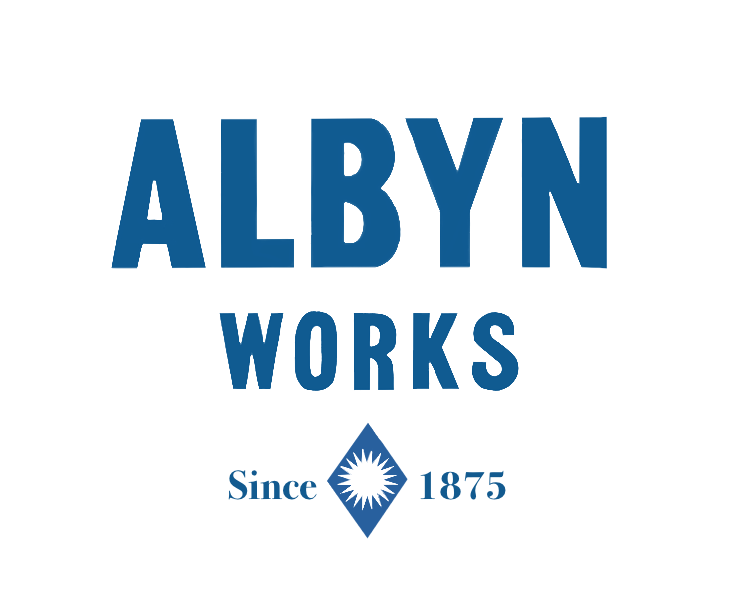The Albyn Works Story…



Delving deep into Sheffield Libraries archives, we’ve found Blanco described as:
“A preparation for whitening military equipments, tennis and cricket shoes, white helmets, hunting gear, breeches, gloves, whip thongs, girths and all articles of buff or buckskin leather.”
Not your average working man’s accoutrement!
In 1824 John Needham invented a metal polishing paste in response to the growing success of the Sheffield metal and silver industry. He produced the polish from his home and business premises at 120 Harvest Lane, aided by Harriet, his niece.
A young apprentice, named Joseph Pickering, from the silversmiths James Dixon’s & Sons, often called to pick up the polish, and a romance blossomed between him and Harriet. During this time the business began to grow, and they moved to a premises further up the road on Harvest Lane.
John Needham died in 1846, and Joseph and Harriet were married a year later and the two of them took over the business, renaming it ‘Joseph Pickering (successor to the late John Needham)’. They built a new premises, ‘Polish Works’ on Mowbray street and by 1849 they owned 9 houses as well as Polish Works.
By 1860, Joseph was a churchwarden at St. Michael’s and All Saints Church, and later a city councillor, and had started a family. Even after the Sheffield flood of 1864, despite the factory being damaged, the business was flourishing, and they outgrew their Mowbray Street factory and moved to a new Polish Works on Burton Road. Joseph’s three sons were now working alongside him, so he renamed the business to ‘Joseph Pickering and Sons’. He was an excellent employer, he provided affordable housing on Percy Street for many of his 100 plus employees, as well as a sickness and benefits club.
The second of the sons, John Needham Pickering, followed in his grandfather’s footsteps and invented his own polish mixture around 1880, and named it Blanco. He was regarded as the quiet and clever son, who preferred to sit alone testing batches of Blanco, reportedly by tasting each mixture!
Blanco was a pure white compressed block of polish, which was initially just used for sports shoes equipment but was then taken up by the military for dress uniforms at the Hillsborough barracks. But soon enough, use of Blanco had spread to every corner of the Empire, and was used by armies in over 60 countries.
Blanco was messy and unpleasant to work with, but to cope with its massive success its production was moved into a new purpose-built extension block to the Polish Works factory after the death of Joseph Pickering. The factory was renamed ‘Albyn Works’. Albyn from the Latin Albus, meaning white.
The packaging needs of the company had, since the earliest days, been provided by Arthur Truelove who had a business as a tin plate and cardboard box manufacturer on Moore Street. Arthur married Joseph Pickering’s daughter Mary, while his elder brother Isaac married Joseph’s sister Hannah. The companies merged to for ‘Joseph Pickering and Sons Limited’ in 1900. A new “fireproof” terracotta tiled building was built in Moore Street in 1906 to produce cardboard boxes, the elaborate façade of which can still be seen today.
In addition to his packaging skills, Arthur Truelove became a councillor and Alderman of Sheffield and built two working men’s hostels, which provided clean accommodation at a reasonable cost for workers.
During both world wars, demand for different shades of Blanco became apparent. The company produced Khaki Blanco and Web Blanco, for the new uniform shades and materials. The RAF also had a shade of their own.
In the late 1950’s production ceased with the invention of modern polishes the end of compulsory military service and the decline of Sheffield’s steel and metalwork industry. This meant that packaging production became the company’s lifeline. The company downsized in the 1980’s and both Albyn Works and the Moore Street factories were sold. Joseph Pickering and Sons Limited finally ceased trading in 2009, after running for 185 years.
Today, Albyn Works is still an inspiring place to run a business. It is now a small business centre, home to many makers, creators and innovators, continuing the legacy of flourishing business in Albyn Works, which all started with John Needham and Joseph Pickering.
